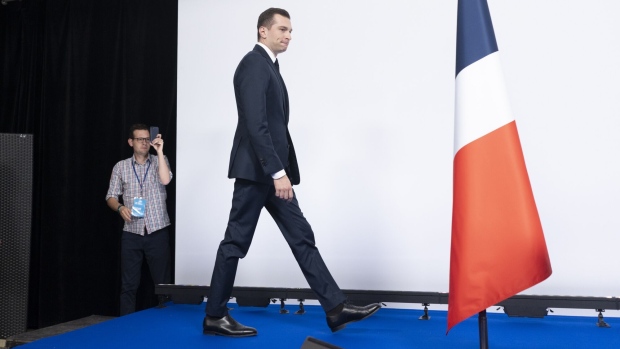Jul 1, 2024
Main French Parties Court Rivals as Vote Heads to Second Round
, Bloomberg News

(Bloomberg) -- President Emmanuel Macron’s centrist alliance and the left-wing New Popular Front have until this evening to strategically pull candidates from France’s final round of voting Sunday in a last-ditch effort to keep a dominant far-right out of power.
The deadline for candidates to file papers to enter the second round is 6 p.m. on Tuesday. So far, 190 candidates had dropped out — 123 from the left and 64 from Macron’s group — according to Le Monde newspaper, in a tactical maneuver to reduce the National Rally’s chances.
The attempt comes after Marine Le Pen’s National Rally and its allies dominated the first round of voting two days ago, locking up 33.2% of the vote. The leftist alliance New Popular Front got 28% and Macron’s coalition won 20.8%.
In more than half of the 577 constituencies, three people qualified for the runoffs. In those situations, the third-placed candidate can withdraw to boost the chances of another mainstream party defeating the National Rally.
The potential for a hung parliament raises the possibility of a broad, minority government, according to former Bank of France Governor Jean-Claude Trichet.
“A technocratic government is not in the French tradition at all. It might be a solution in other countries, namely Italy,” Trichet, who was also the European Central Bank chief, told Bloomberg Television. “In France it is not the case because we are in a totally different political framework.”
Prime Minister Gabriel Attal and Jordan Bardella, the president of the far-right National Rally, both sought to court voters from a wide range of parties in separate live interviews on French TV TF1 late Monday.
In his quest for an absolute majority in parliament, Bardella called on voters to rally behind his party’s candidates in the second round on Sunday, even reaching out to“moderate left-wing voters who don’t accept extremism and radicalism.” For his part, Attal asked all groups to join forces to block the far right from winning an outright majority. He sought a “pluralistic National Assembly” that would unite parties from the right and the left that would work on legislation “bill by bill.”
“We need to govern differently,” Attal said, even though his outgoing government had sought to operate on those very principles. “It’s a sign that we’ve heard the message from the French and from the ballot box.”
The interviews came as the French political world is embarked on an intense period of bartering as each party tries to maximize its chances in the final ballot on Sunday. Even though Macron’s presidency isn’t formally at stake – and he’s said he has no plans to resign – Sunday’s result indicates he’ll either have to share governing responsibilities with Le Pen’s group or manage a parliament that is basically gridlocked.
An absolute majority for the National Rally would hand the premiership to Bardella and assure his party’s ability to easily pass legislation. Historically, France’s mainstream has banded together to keep the far right — which has never held power in the modern French republic — out of government.
The far-right party and its allies would need 289 seats for an outright majority. They won or made it to the second round in 485 districts out of 577. Their candidates came first or were elected outright in the first round in 297 of them, according to Franceinfo radio.
Yields on French government bonds rose for a fifth straight day on Tuesday, widening the risk premium over German peers back to 76 basis points. The euro meanwhile slumped, erasing all of Monday’s post-election bump.
French stocks fell again, reversing nearly all of their relief rally on Monday. The CAC 40 is down 6.7% since Macron called the snap elections, trading near five-month lows hit last week, with the shares of Societe Generale SA and Credit Agricole SA down more than 10%.
Raphael Glucksmann, a leader of the New Popular Front, on TF1 TV declined to specify whether he would back a cross-party government. But he joined Attal’s call urging French voters and politicians alike to do everything they can to prevent the National Rally from obtaining an absolute majority. He described the election as “a referendum” on whether the French want a far-right government.
Xavier Bertrand, from the center-right Republicans, told TF1 that he objected to a deal with the far right while also declining to rally behind Macron and Attal.
Macron’s Renaissance party said it would pull candidates where they placed third to help those who respect “the values of the republic” beat the far right. There’s a caveat though — the far-left France Unbowed, which is part of the New Popular Front alliance, has proposed a raft of spending that would flout European Union budget rules and potentially alarm investors.
So it’s not clear whether Macron’s party will withdraw in races where the far left would benefit. On Monday, Attal said they would consider such races on a case-by-case basis.
In an interview with Le Figaro on Tuesday, French Finance Minister Bruno Le Maire reiterated that he would not support France Unbowed, saying he would refuse to vote for the far-left party.
“We do not fight the RN with the values of France Unbowed,” Le Maire said, referring to the National Rally’s French acronym.
Le Pen’s margin of victory was smaller than some polls had indicated. That, together with the news that mainstream parties were exploring ways to lock her group out of power, drove an initial market rally before investor optimism about the outcome began to fade.
“This government will be complete, it will be competent,” Le Pen said in a radio interview Tuesday. “It will be made up of people from the National Rally, people who took part with us in the electoral battle of the first round.”
--With assistance from Vidya Root and Phil Serafino.
(Updates with Trichet comment in the sixth paragraph.)
©2024 Bloomberg L.P.







